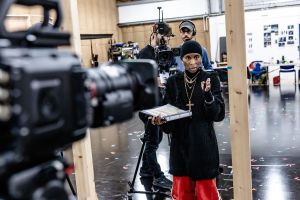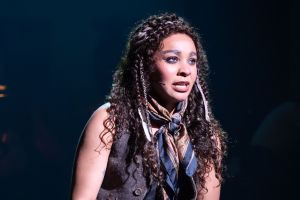Star Turns in Company Values
Lyn Gardner has written a Guardian column musing on why critics don’t really write about acting any more. One reason, she suggests, is the shrinkage of space. The other is the rise of the democratic ensemble ethos in our theatre.
There’s something in both of those diagnoses, but it’s only half the story. All critics, myself included, are obsessed about relaying the message of a play, the content of its argument, its meaning. In short, what’s it all “about,” Alfie?
This is what makes the more ethereal, impressionistic writing of Susannah Clapp on the “immersive” Alice in Wonderland performance in Norwich, for instance, so unusual; or indeed some of Lyn’s own more descriptive reviews of way-out fringe events unique as chronicles.
Acting as such, or the actual technical details of what an actor does, has been relegated in a critic’s list of priorities, a fact of life brilliantly bemoaned and indeed exposed by Simon Callow in his My Life in Pieces collection of journalism and tributes.
But there’s also a fallacy at the heart of Lyn’s argument: that ensemble acting is somehow the enemy of star turns, that a properly coherent production obliterates the “need” almost for stand-out full-blooded theatricality and the critic’s duty to try and write about that phenomenon.
Simply put, the greatest ensembles always had the greatest actors in them: the Berliner Ensemble with Ekkehard Schall and Helene Weigel, the Comedie Francaise, and other French companies, with Madeleine Renaud and Jean-Louis Barrault, the Rustaveli Theatre of Georgia with the towering Ramaz Chikhvadzye, our own RSC with Judi Dench and Ian McKellen, the National with Maggie Smith and Olivier, and so on.
Today’s ensembles such as Punchdrunk, or Frantic Assembly, or Filter, or a Katie Mitchell production, don’t have star turns and don’t always have very good actors; the acting is always so poor, or indeed uncared-about, in something like Punchdrunk’s Masque of the Red Death, that its claims to some other form of theatrical value remain, for me, strictly limited.
Even Grotowski’s laboratory theatre of the 1970s had remarkable actors, as indeed have the often anti-theatrical productions of Peter Brook. The trouble is, as critics, we often take this fact of life for granted. We probbaly have to face the truth that none of us writes even half as well as the greatest chroniclers of great acting such as William Hazlitt, Kenneth Tynan or the underrated, uncollected Ronald Bryden.
It’s much easier to write a facile summarising review with a few adjectival compliments or insults about the acting thrown in — which is generally what happens — than it is to anatomise a performance, inspect its wellspring and describe its efflorescence in language that not only captures that performance, but also continues it in some way, makes it truly alive.
And you don’t need a thousand words to do it. I think Lyn’s article is a very good challenge to the critics to spend those couple of hundred words exclusively on one or two performances and leave the meaning of the play, and the lighting plot, to take care of itself.
Having said that, I see that I’ve done the usual fairly routine critical review job myself on last night’s coruscating National Theatre revival of The Cherry Orchard in the Olivier, though I could have spent another five hundred words describing exactly how Bunny Christie’s fantastic wooden set works, and how the scene changes are elided by lighting, sound and beautifully orchestrated ensemble movement.
Perhaps each performance on the stage should have been assigned to a different critic: there’s certainly enough going on with Zoe Wanamaker‘s Ranyevskaya, Conleth Hill‘s Lophakin or Claudie Blakley‘s Varya to justify such a tactic.
But it’s only by considering the whole stage that you appreciate the individual contributions within it. Wanamaker, for instance, seems to drift in another plane to everyone else. Her brother, James Laurenson‘s Gaev, seemes a little too rumpled and over-age, and he obviously — like so many Gaevs you see — has done insufficient research on how exactly to hold an imaginary snooker cue.
Some of the social distinctions within the cast are blurred, too, when you start to think about it. Does Gerald Kyd‘s Yasha really behave like a footman, or manservant, as the programme has it? He carries on as if he owns the place, and his seduction of Emily Taaffe‘s pertly gullible Dunyasha is both shocking and way beyond what Chekhov actually wrote. Yasha’s an accidental heart-breaker, not a reprehensible rapist.
Similarly, Mark Bonnar‘s emphatically Celtic Trofimov is a bit long in the tooth for a student in his late twenties, and maybe Kenneth Cranham‘s twenty years shy of old Firs’s stipulated 87 years.
These things do matter, because Chekhov sets the play at a specific historic time to which almost everyone on the stage refers, either backwards or forwards.
Still, I loved the evening overall, and I especially loved Cranham’s Firs, played not with the usual doddery old chappiness, but with a rock-like senescent grandeur, recalling old times like a puffy-eyed pugilist and embracing his lonely demise like a true champion hitting the canvas for the last time.












